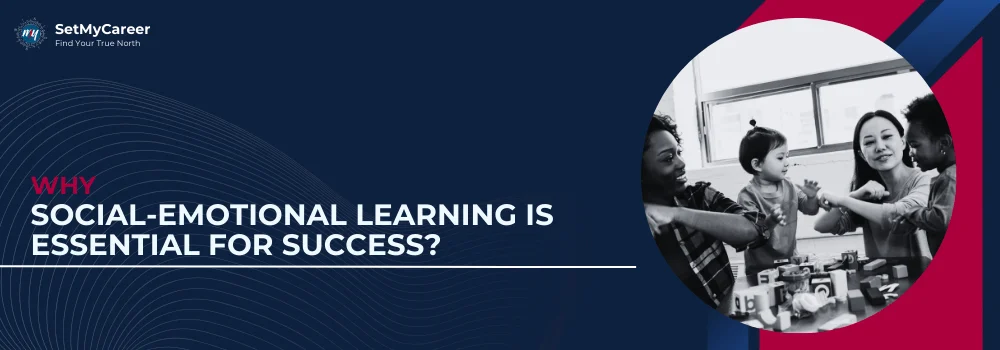Published by Jyothi Patil on 6 September 2024
Content Strategist | Editorial Team Member
Jyothi Patil is a skilled writer with a strong background in English literature, which she applies to crafting engaging content across various platforms. From writing blogs for her website and guest posts to creating pieces on Medium and Substack, Jyothi excels in making complex ideas easy to understand.
Learn how social-emotional learning equips students with vital skills for academic excellence, personal growth, and long-term career success.

Imagine a classroom where students not only learn math and science but also understand how to manage their emotions and connect with others. It’s not just about getting good grades but about building skills that help them succeed in life. This is what Social-Emotional Learning (SEL) is all about—a way to teach students how to handle challenges and grow both personally and socially.
SEL helps students reduce stress, communicate better, and build empathy. It prepares them to not just do well in school but to become confident and emotionally strong individuals, ready to face life’s ups and downs.
Why is SEL important ? It helps people at work, in relationships, and in their communities. From handling conflicts to leading teams with understanding, SEL shapes how we succeed in all parts of our lives.
Social-emotional learning (SEL) is a process where children and adults learn to understand and manage their emotions, set positive goals, show empathy for others, build healthy relationships, and make responsible decisions. It’s not just about academics—SEL helps develop life skills that are essential for their student well-being and future success. Whether it’s handling stress, making friends, or dealing with challenges, SEL provides the tools to navigate both school and everyday life.
For parents, SEL supports a child’s emotional development, helping them become more resilient and confident. This prepares them not only for success in school but also for future careers and personal relationships. Let’s break down the five key components of SEL that contribute to overall growth.

The key to success is not just IQ—discover how EQ plays a role
Get Started TodayThis is the ability to understand your own emotions, strengths, and weaknesses. Being self-aware helps students recognize how their feelings affect their thoughts and actions. For example, when a student is feeling anxious about a test, self-awareness allows them to identify the emotion and manage it in a healthy way.
Self-management is about controlling emotions, thoughts, and behaviours in different situations. It includes how to manage stress, staying motivated, and setting goals.
This component involves understanding the feelings and needs of others. Students learn to see things from someone else’s perspective and show empathy. Social awareness helps in building stronger friendships and creating a positive learning environment.
Relationship skills are all about communicating clearly, listening well, and resolving conflicts respectfully. These skills are crucial for teamwork and maintaining healthy friendships. For example, learning how to resolve a disagreement with a classmate helps students avoid bigger conflicts later on.
This involves making thoughtful and respectful choices about personal behavior and social interactions. It includes considering the well-being of oneself and others. Responsible decision-making teaches students to weigh the consequences of their actions and make choices that lead to positive outcomes.
By focusing on these five components, SEL helps students build a strong foundation for both academic success and personal growth.
Social and Emotional Learning (SEL) offers numerous advantages that contribute to a well-rounded education. Here are some of the key benefits of implementing SEL:
Improved Academic Performance: SEL enhances focus, self-management, and motivation, leading to better grades.
Better Emotional Regulation: Students learn to manage stress and emotions, creating a positive learning environment.
Enhanced Social Skills: SEL develops empathy, communication, and conflict resolution skills, essential for healthy relationships.
Reduced Behavioral Problems: Teaching self-control and emotional regulation decreases disruptive behaviors like bullying.
Long-Term Success: SEL skills such as empathy and problem-solving are vital for success in both careers and personal life.
This table highlights the key differences between the flipped and traditional classroom models, illustrating how the flipped approach aims to make learning more interactive and student-centered.
Bringing Social and Emotional Learning (SEL) into the classroom helps create a positive and supportive environment. Here are some simple ways to include SEL:
Start with Morning Check-ins: Begin the day by checking in with students, allowing them to share how they feel and connect with each other.
Teach SEL Through Lessons: Include SEL topics like teamwork, kindness, and patience in your regular lessons and activities.
Be a Role Model: Show students how to listen well, be kind, and solve problems calmly by demonstrating these behaviors yourself.
Practice Mindfulness: Use simple mindfulness activities like deep breathing or quiet time to help students relax and focus.
Use SEL Programs: Consider using SEL programs or activities that are already designed to teach these important skills.
Encourage Positive Behavior: Praise and reward students when they show SEL skills like helping others or staying calm.
These steps make it easy to bring SEL into everyday classroom life, helping students grow emotionally and socially.
Incorporating Social-Emotional Learning into education and personal development is more than just a trend—it's a critical component of success. By fostering emotional intelligence and interpersonal skills, SEL prepares individuals for academic, professional, and personal achievements. Ready to enhance your own or your child's social-emotional skills? Connect with our experts at SetMyCareer to explore how SEL can explore new opportunities and guide you toward a brighter future.
No. 14/595, 1st Floor, Nanjappa Reddy Layout, Koramangala 8th Block, Bangalore 560095